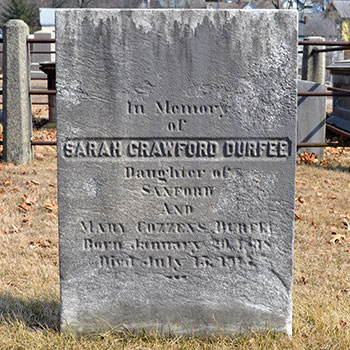Sarah Crawford Durfee was born to Sanford and Mary C. (Cozzens) Durfee on January 20, 1838, in Warwick, Rhode Island. Both of her parents descended from early settler families in 17th century Connecticut, Massachusetts, and Rhode Island. Her father was treasurer of a cotton manufacturing company, and amassed some modest wealth. Sarah lived with her father and stepmother, Mary E. Durfee, until their deaths in 1879 and 1880, respectively, and then she apparently lived alone (with a few servants from Ireland and Sweden) for the remainder of her life.
Though contemporary society and the census records never allow Sarah Durfee an occupation, she worked for more than forty years. An active member of Providence’s First Baptist Church, she served as president of the Women’s City Missionary Society, organized in March 1868, to “assist the poor in efforts to help themselves, and to engage in general missionary work for the city, providing homes for women who desire to reform, where they may be enabled to earn an honest livelihood, and aiding poor girls to procure respectable homes and employment.” This work was carried on by boards of visitors in different wards, who also solicit funds from charitable people, to be used in promoting the cause. Many of the leading women of the city participated in some way, as members who contributed money to the cause or as visitors who checked in on the indigent in their wards. As an example of the extent of their work, for the year ending November 14, 1881, volunteers made 2,018 home visits and the society assisted 707 families, expending nearly $2,500.
Eventually the Society established the Women’s City Missionary Society Laundry, at 155 Clifford Street in the Jewelry District of Providence. Starting in 1897, the venture employed many needy women, helping them to learn marketable job skills. An economic downturn and growing competition from commercial laundries forced the closure of the society’s “industrial home” in 1908.
There were limits to the society’s generosity however, as those they helped had to first pass the test to be deemed “the worthy poor.” The worthy often included the aged, who otherwise ended up in the alms house if they had insufficient savings and no children able to care for them. But the society firmly rejected “those who are determined to live idle, profitless lives” because of their “want of courtesy and disregard of truth.” The “families of the drunkard” fared no better, as the generally pro-temperance women of the society felt nothing could be done for them until the law forbade the consumption of alcohol. Indigent children were encouraged to enter into training in kitchen and garden, so they might become employable servants to the same class as the people that sponsored their education.
At some point in the early years of the City Missionary Society, Sarah Durfee ceased to lead the organization. This probably occurred when her involvement with the Woman’s Baptist Foreign Missionary Society increased. The organization was founded in 1871 and Durfee was the Providence representative from the beginning. She later served as the group’s clerk, and later still as its president for fifteen years before stepping down and becoming an honorary president for life, sometime before 1910. As president, Durfee directed an extensive national organization and was intimately involved with international missionary programs in Africa, East Asia, and Europe. Miss Mary A. Greene, like Durfee a member of the First Baptist Church in Providence, served as vice president of the national organization and as its attorney.
Sarah Durfee passed away on July 15, 1915 at the age of 77 and was buried near her parents in the North Burial Ground.
Erik Christiansen, PhD
Further Reading
Gilkeson, John S. Middle Class Providence, 1820-1940. Princeton: Princeton University Press, 1999.
Katz, Michael. The Undeserving Poor: America’s Enduring Confrontation with Poverty. New York: Oxford University Press, 2013.
The Women’s City Missionary Society records are at the Rhode Island Historical Society, MSS 812. The RIHS also has some records of the Women’s Baptist Foreign Missionary Society in MSS 153.
 Sarah Crawford Durfee was born to Sanford and Mary C. (Cozzens) Durfee on January 20, 1838, in Warwick, Rhode Island. Both of her parents descended from early settler families in 17th century Connecticut, Massachusetts, and Rhode Island. Her father was treasurer of a cotton manufacturing company, and amassed some modest wealth. Sarah lived with her father and stepmother, Mary E. Durfee, until their deaths in 1879 and 1880, respectively, and then she apparently lived alone (with a few servants from Ireland and Sweden) for the remainder of her life.
Sarah Crawford Durfee was born to Sanford and Mary C. (Cozzens) Durfee on January 20, 1838, in Warwick, Rhode Island. Both of her parents descended from early settler families in 17th century Connecticut, Massachusetts, and Rhode Island. Her father was treasurer of a cotton manufacturing company, and amassed some modest wealth. Sarah lived with her father and stepmother, Mary E. Durfee, until their deaths in 1879 and 1880, respectively, and then she apparently lived alone (with a few servants from Ireland and Sweden) for the remainder of her life.